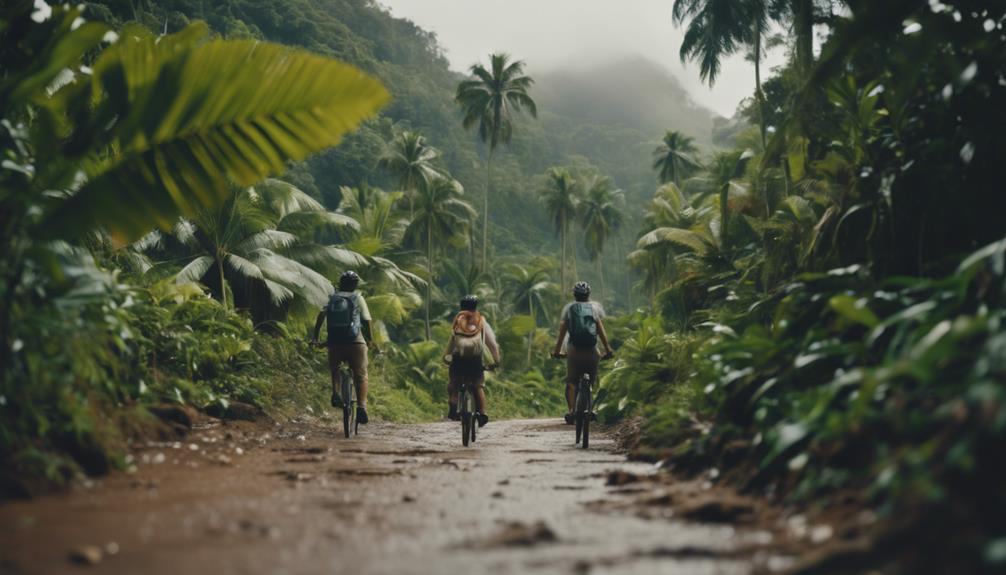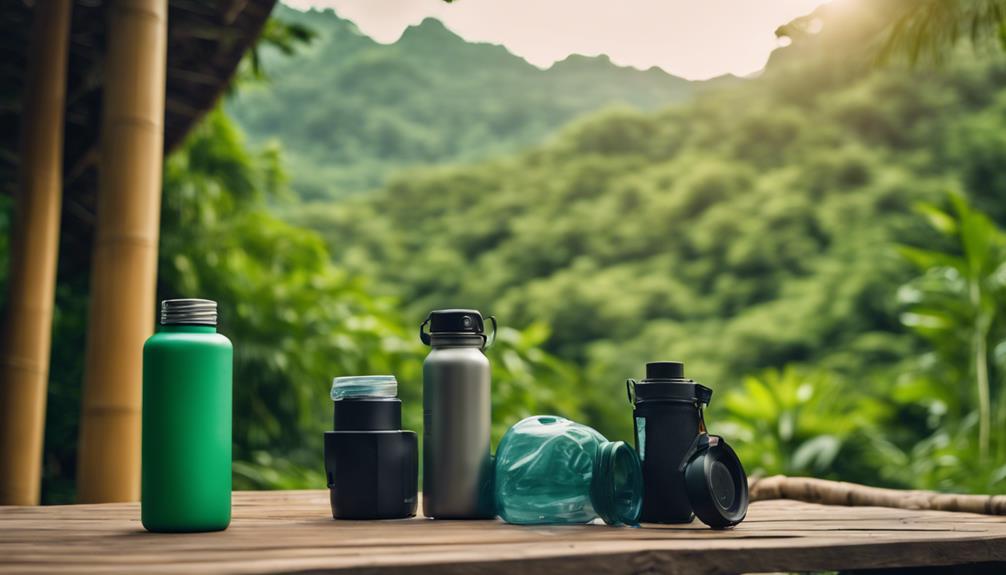Get ready for your backpacking trip by setting realistic expectations for the journey. Build mental resilience by cultivating a strong sense of purpose and practicing visualization techniques. Visualize success and challenges to reduce anxiety and boost motivation. Train your mind and body with yoga, meditation, and strength training. Seek advice from experienced hikers to gain valuable insights. Embrace positive thought patterns and adaptability to enhance problem-solving skills. Set clear goals, visualize success scenarios, and break down the adventure into manageable milestones. These strategies will help you conquer the mental peaks of your trip and enjoy a fulfilling experience.
Key Takeaways
- Set realistic expectations to understand the challenges.
- Build mental resilience through purpose and visualization.
- Engage in mental imagery to prepare for obstacles.
- Prioritize training with yoga, meditation, and strength exercises.
- Seek advice from experienced hikers for insights and tips.
Setting Realistic Expectations
Commencing a backpacking journey with realistic expectations is vital for mentally preparing yourself for the challenges ahead. Backpacking trips entail both physical and mental challenges that require resilience.
Understand that your trip will push you both physically and mentally. The journey may be physically demanding, with long hikes, heavy packs, and diverse terrains to navigate. Mentally, you may face unexpected weather changes, trail obstacles, and moments of fatigue.
Acknowledging these realities helps you mentally brace for the journey ahead. Embrace the idea that not every moment will be easy or enjoyable. Challenges are part of the backpacking experience, and managing your expectations is key to staying resilient.
Building Mental Resilience
To thrive during challenging backpacking trips, cultivating mental resilience is essential for overcoming obstacles and achieving success. Mental preparation plays a significant role in building this resilience.
Start by setting a strong sense of purpose for your journey. Knowing why you're setting out on this adventure will help you stay motivated when faced with difficulties. It's also pivotal to have realistic expectations. Understand that challenges will arise, but it's how you respond to them that matters most.
Practice visualization techniques to envision yourself conquering obstacles along the way. This can help boost your confidence and mental strength. Incorporating positive affirmations into your daily routine can also reinforce a positive mindset.
Remember that many aspiring thru-hikers give up not due to physical limitations but mental fatigue. By focusing on building your mental resilience, you're setting yourself up for long-term success in challenging backpacking expeditions.
Visualizing Success and Challenges
Visualizing accomplishment and overcoming hurdles before embarking on a backpacking adventure can greatly improve your readiness, confidence, and overall experience on the trail. By engaging in mental imagery of conquering challenges, you prepare yourself for unexpected obstacles that may arise during your journey. This practice not only reduces anxiety but also boosts your motivation and problem-solving skills. Visualizing success helps you stay focused during tough moments and enhances your adaptability to different situations.
As you picture yourself maneuvering through various scenarios, you're effectively training your mind to handle adversity with resilience. This mental preparation creates a sense of familiarity with the trail, enabling you to approach difficulties with a calm and collected mindset. Embrace the power of visualization to not only envision the triumphs you'll achieve but also to strategize for the obstacles that may come your way. This proactive approach won't only enhance your backpacking experience but also instill a sense of confidence in your abilities to overcome any challenges that may arise.
Training and Conditioning Techniques
Prepare your body and mind for the backpacking journey by incorporating yoga, meditation, and strength training into your routine to enhance your mental and physical readiness. Starting your training regimen at least a month before the trip is vital. This will help build endurance, prevent injuries on the trail, and boost your overall performance.
Engage in fitness and stretching exercises to reduce the risk of strains or sprains, ensuring your body is well-conditioned for the challenges ahead. Prioritize self-care by getting adequate rest and staying hydrated, as this is essential for maintaining both your mental and physical well-being during the trip.
Seeking Advice From Experienced Hikers
When gearing up for your backpacking adventure, reaching out to seasoned hikers is a must. Their wealth of experience can provide you with invaluable insights on everything from trail conditions to mental preparedness strategies.
Learn From Veterans
Connect with seasoned backpackers to gain invaluable insights on trail conditions, gear recommendations, and mental strategies for your upcoming adventure. Learning from veterans can provide you with essential tips on managing emergencies, traversing challenging terrain, and boosting your morale when faced with obstacles.
Their extensive backpacking experience can help you avoid common mistakes, ensuring a successful trip. Additionally, veterans can offer valuable advice on route planning, selecting the best campsites, and dealing with wildlife encounters.
Engaging with these experienced hikers won't only enhance your overall backpacking experience but also boost your confidence and address any concerns you may have. Take advantage of their wisdom to make the most out of your adventure.
Tap Into Wisdom
Drawing from the knowledge and experience of seasoned backpackers can greatly enrich your understanding of trail conditions and equip you with valuable insights for your upcoming adventure. When tapping into wisdom from experienced hikers, consider the following:
- Trail Conditions: Learn about the terrain and weather challenges you may face.
- Challenges: Understand common obstacles and how to overcome them.
- Gear: Get recommendations on essential equipment for a successful trip.
- Navigation: Gain tips on reading maps and using compasses effectively.
- Safety Tips: Receive advice on staying safe in the wilderness.
Connecting with those who've walked the paths you're about to undertake can provide you with a sense of belonging in the backpacking community and boost your confidence for the journey ahead.
Gain Insider Knowledge
To gain valuable insights and tips for your upcoming backpacking trip, seek advice from experienced hikers who can provide firsthand knowledge of trail conditions and gear recommendations.
Making the effort to connect with seasoned backpackers won't only help you mentally prepare for the challenges ahead but also equip you with insider knowledge essential for a successful adventure.
By tapping into the expertise of those who've already navigated similar terrains, you can anticipate obstacles, plan effectively, and guarantee a smoother journey.
These experienced hikers offer practical advice on navigation, safety precautions, and overall preparation that can make a significant difference in how you approach your backpacking adventure.
Embrace the wisdom they share to enhance your readiness and confidence for the trip ahead.
Practicing Relaxation and Mindfulness
Prepare yourself mentally for your backpacking trip by engaging in relaxation and mindfulness practices. As you gear up for your adventure, taking care of your mind is just as essential as preparing your equipment. Here are some practical tips to help you achieve mental clarity and calm before setting off on your journey:
- Engage in deep breathing exercises: Inhale deeply through your nose, allowing your lungs to fill with air, then exhale slowly through your mouth, releasing any tension.
- Practice mindfulness: Focus on the present moment, absorbing the sights, sounds, and sensations around you to cultivate a sense of awareness and appreciation.
- Incorporate meditation techniques: Set aside time to meditate, allowing your mind to quiet down, promoting relaxation and mental rejuvenation.
- Use progressive muscle relaxation: Tense and then relax each muscle group in your body, starting from your toes and working your way up, to release physical tension.
- Prioritize self-care activities: Engage in yoga or stretching routines to nurture your body and mind, ensuring you're physically and mentally prepared for the challenges ahead.
Developing Positive Thought Patterns
As you start on your backpacking adventure, shaping positive thought patterns can greatly elevate your confidence and resilience along the trail. Embracing affirmations and mantras is a powerful way to reframe any negative self-talk into constructive and motivating thoughts. By incorporating positive phrases like 'I am capable of overcoming any challenge' or 'I am strong and resilient,' you can boost your confidence and fortitude when facing obstacles during your journey.
Moreover, visualizing success in various scenarios, such as reaching the mountain peak or traversing a difficult terrain, can enhance your mental preparedness for the backpacking challenges ahead. Picture yourself surmounting hurdles with ease and grace, reinforcing your belief in your abilities. This mental exercise not only increases your confidence but also primes your mind to adapt positively to unexpected situations.
Embracing Uncertainty and Adaptability
Embrace the unknown challenges that may arise during your backpacking journey, as they'll test your adaptability and resilience along the trail. Uncertainty is a natural part of any outdoor adventure, and being prepared to face unexpected challenges won't only make your journey more rewarding but also help you grow as a backpacker.
Here are some key points to keep in mind:
- Embracing uncertainty: Welcome the unknown with an open mind, as it can lead to new experiences and opportunities for personal growth.
- Developing adaptability: Learn to adjust to changing circumstances on the trail, whether it's sudden weather changes or unexpected trail conditions.
- Enhancing problem-solving skills: Embrace challenges as opportunities to sharpen your ability to think on your feet and find creative solutions.
- Promoting a positive mindset: Stay optimistic and focus on the beauty of the journey, even when faced with setbacks.
- Building resilience: Use each obstacle as a chance to cultivate inner strength and overcome hurdles with determination.
Goal Setting for Mental Preparedness
You're prepared to elevate your mental readiness for backpacking by establishing clear goals. Visualizing successful scenarios and breaking them down into attainable milestones will help you stay focused and motivated throughout your journey.
Let's delve into the importance of goal setting for mental preparedness on your upcoming backpacking trip.
Visualizing Success Scenarios
Feeling mentally prepared for your backpacking trip begins with visualizing success scenarios and setting specific goals to boost your confidence and readiness.
Here are some tips to help you enhance your mental preparedness:
- Visualize Success Scenarios: Imagine successfully reaching your destination and enjoying the breathtaking views.
- Set Specific Goals: Define clear objectives for your trip, whether it's reaching a certain lookout point or completing a challenging trail.
- Imagine Overcoming Obstacles: Visualize yourself confidently tackling rough terrains or unexpected weather conditions.
- Reduce Anxiety: Focus on the positive outcomes of your journey to alleviate any pre-trip worries.
- Increase Motivation: Use mental rehearsal to envision yourself persisting through difficulties and staying motivated till the end.
Setting Achievable Milestones
Setting attainable milestones during your backpacking journey is pivotal for enhancing mental preparedness and staying motivated throughout the trip. By setting specific milestones, you break down the challenging adventure into manageable segments, allowing you to track progress and feel a sense of accomplishment as you reach each goal. These milestones will help you focus on daily targets or particular segments of the hike, boosting your determination to keep pushing forward. Additionally, they act as tangible markers of progress, aiding in overcoming mental barriers that may arise during the trip. Here is a table summarizing the importance of setting achievable milestones:
| Milestone Setting Benefits | ||
|---|---|---|
| Enhances mental preparedness | Provides a sense of accomplishment | Fosters focus and determination |
Post-Trip Reflection and Growth
Reflecting on the challenges overcome during your backpacking trip can serve as a powerful catalyst for personal growth and self-discovery. As you explore your post-trip reflection, consider the following key points to help you grow from your experience:
- Review Your Trip Reports: Take time to go through your trip reports or journal entries to understand your journey better.
- Assess Your Mental Resilience: Reflect on how you handled difficult situations and how you can further strengthen your mental resilience.
- Enhance Problem-Solving Skills: Identify the problems you faced and evaluate the effectiveness of your solutions to improve your problem-solving skills.
- Find Joy and Fulfillment: Recall the moments that brought you joy and fulfillment during the trip to replicate them in future adventures.
- Refine Your Coping Strategies: Recognize any shortcomings in your coping strategies and work on enhancing them for upcoming challenges.
Frequently Asked Questions
How Do You Mentally Prepare for Backpacking?
To mentally prepare for backpacking, focus on maintaining a positive mindset, using visualization techniques, practicing mindfulness, building mental toughness, implementing self-care strategies, nurturing emotional resilience, and setting achievable goals. You got this!
How Do I Mentally Prepare for a Trip?
To mentally prepare for a trip, start by visualizing success, practicing mindfulness, and using positive affirmations. Incorporate breathing exercises, journal reflections, and meditation sessions. Immerse yourself in nature to find calm and focus.
How Do You Mentally Prepare for Adventure?
To mentally prepare for adventure, visualize success, use positive affirmations, practice mindfulness, focus on breathing, set goals, train mental toughness, and employ relaxation strategies. Seek support from experienced individuals to gain valuable insights and reassurance.
How Do You Train for an Intense Backpacking Trip?
To train for an intense backpacking trip, focus on physical endurance, mental strength, trail nutrition, hydration tips, gear preparation, muscle recovery, and trail safety. Prioritize consistency, gradual progress, and proper rest to maximize your readiness.
Conclusion
As you commence on your backpacking trip, remember to trust in your mental preparation. Setting realistic expectations, building resilience, and visualizing success will help you face any challenges that come your way.
Seek advice, embrace uncertainty, and stay positive throughout your journey. Remember, growth comes from pushing yourself outside your comfort zone.
Stay strong, stay focused, and enjoy the adventure ahead. Happy hiking!














